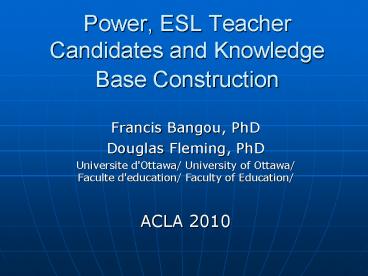Power, ESL Teacher Candidates and Knowledge Base Construction - PowerPoint PPT Presentation
1 / 14
Title:
Power, ESL Teacher Candidates and Knowledge Base Construction
Description:
Power, ESL Teacher Candidates and Knowledge Base Construction Francis Bangou, PhD Douglas Fleming, PhD Universite d'Ottawa/ University of Ottawa/ – PowerPoint PPT presentation
Number of Views:87
Avg rating:3.0/5.0
Title: Power, ESL Teacher Candidates and Knowledge Base Construction
1
Power, ESL Teacher Candidates and Knowledge Base
Construction
- Francis Bangou, PhD
- Douglas Fleming, PhD
- Universite d'Ottawa/ University of
Ottawa/Faculte d'education/ Faculty of
Education/ - ACLA 2010
2
Purpose
- To analyze teacher candidates knowledge base
construction related to 1) ESL teaching and
learning theories 2) English Language Learners
(ELL) and 3) Teaching ESL. - To analyze the contributions of a blog to the
construction of such knowledge base
3
Second Language Teachers Knowledge Base (SLTKB)
- Traditionally based on
- applied linguistics
- methodology
- second language acquisition theories
- According to Freeman Johnson (1998)
- socially constructed
- should be centered on the teacher, the context,
and the pedagogy
4
Blogs
- Easily accessible and free
- Enable one to post and respond to messages on the
web - Promote reflective social as well as individual
learning (Lin Yuang, 2006) - Transfer in-class activities outside of the
classroom (Kuzu, 2007).
5
Setting the Stage
- An optional methodology course in ESL
(3.5hrs/week for 5 weeks). - Four blog entries (100 words) and four comments
(50 words) that could be posted anytime during
the session. - As professors we did not contribute to the blog.
6
Methodology
- 31 participants
- Blog postings and comments eight semi-structured
interviews - Discourse analysis (Johnstone, 2008)
- Patterns and unique experiences
7
Facilitation of the reflective process
- It was fun - Yeah that was fun.
- Awareness of colleagues opinions - It just made
me more aware of what other people were
thinking. - Safe space no live audience no instructor -
Theres no instructor at the front of the
classroom whos guiding your discussion
8
- Time to process the information Within the blog
postings people would write really thoughtful
things and have the time to spell it out, the way
they were thinking of it.
9
Concern
- Ill be honest. It wasnt so beneficialYeah.
And, and the reason is because the blog...there
was an agenda for it. Like, the blog...you had
to write something based on the readings or
something like that. And then you were doing it
because that was part of your mark. That
was...so there was the motivation for doing it,
itself . The other thing with the blog that I
discovered was that it was really...it really was
the same people over and over again to
contribute. Like there was a few that I dont
think ever did contribute, or that wouldnt
really...wouldnt really post something that was
more of a critical thinking type. It was more
like, Oh yes. I agree with this. Not so much
of questioning, ahh...you know, cause I think
there were people who questioned about learning
and uh-m, what do you mean...they would say like,
What do you mean by this?
10
Question
- How committed were the teacher candidates if they
approached this exercise mostly as another
assignment that they had to complete?
11
Surviving the program
- Time management strategies - I think what
happened was a lot of people ended up saving
their blogs for the very end so that last week
they really hammered out, you know, four or five
blogs, or whatever the required amount was. - Relying on what was written in the syllabus
- Paraphrasing the content of the course we need
to provide support for them within the
pedagogical context of the classrooms.
12
Power relations
- As instructors, the fact that we did not
participate in the blog discussion did not remove
the power relations at work in the context of the
program.
13
Recommendations
- All the expectations and instructions should be
clearly written on the syllabus and consistently
applied - Make it mandatory to post an entry and a comment
every week. - Provide explicit guidance
- Be a model
14
References
- Freeman, D, Johnson, K. (1998).
Reconceptualizing the knowledge-base of language
teacher education. TESOL Quarterly, 32(3),
397-416. - Johnstone, B. (2008). Discourse analysis.
Blackwell Publishing - Kuzu, A. (2007). Views of pre-service teachers on
blog use for instruction and social interaction.
Turkish Online Journal of Distance Education,
8(2), 34-51. - Lin, H.T. Yuan S.M. (2006). Taking blogs as a
platform of learning reflective journal. ICWL,
38-47































